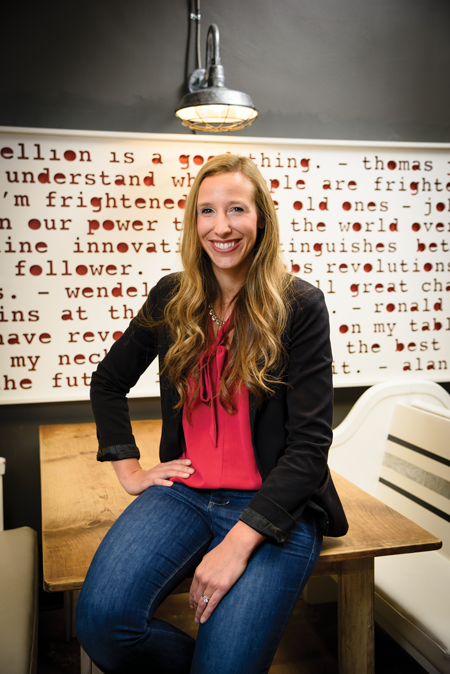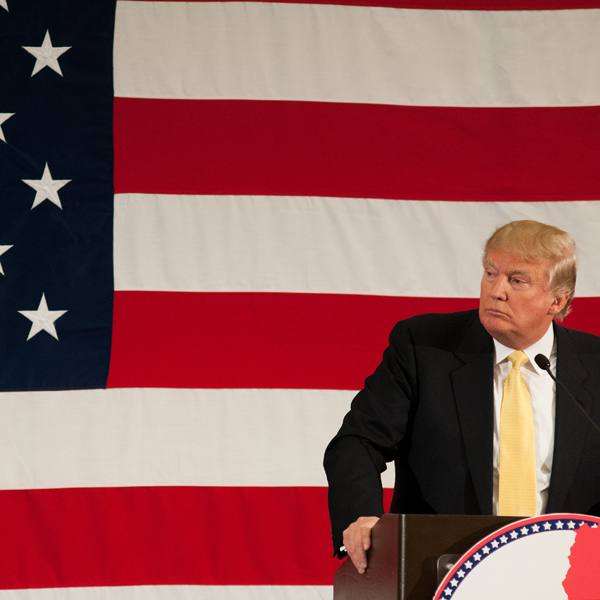10 Questions: Brittany Heyd helps startups solve society's pressing problems

Brittany Heyd. Photograph by David Hills.
If you’re a startup dedicated to solving big problems in sectors such as energy, education and transportation, Brittany Heyd wants to help. She’s the managing director and general counsel at 1776, a global venture capital fund and business incubator based in Washington, D.C., that specializes in linking socially innovative startups with the funding, business connections and expertise necessary to succeed.
Q. How did you choose the name 1776? Is there more to it than the Declaration of Independence and the D.C. connections?
A. 1776 was a critical year for changing the way citizens live, for innovation and for revolutions. There was the start of democracy in America, where the people willed their own self-determination. When institutions don’t work for the people, the people must change the institution, and that’s the spirit of entrepreneurship. 1776 was also the year that the first steamship took off in Britain, starting the Industrial Revolution, and Adam Smith published The Wealth of Nations, starting modern economics.
Q. 1776 does so much, from running an investment fund and a very cool brick-and-mortar co-working space in D.C. to leading a global startup competition called the Challenge Cup and maintaining satellite offices in New York City, San Francisco and Dubai. Yet 1776 only launched in 2013. You were there from Day One. How were you and the team able to accomplish so much so quickly?
A. It was a lot of late nights, for sure! But it all really worked hand in hand. In the first year, we hosted over 200 events and had 300 startups going through our program. There was so much energy that we decided to shift our focus beyond D.C. to become a global hub. We started working with accelerators and incubators in a number of regional places to come together as a community. As our network grew and our knowledge grew, we could share it with others. When we launched our venture fund in the beginning of 2014, we gained the ability to invest our own money in startups. Our first year, there were four of us, and we’ve grown to over 50 people now.
Q. Do you think your story has lessons for other startups?
A. Definitely. It seems like a lot of work and a big mountain if you just look at the end product. But you start small and build upon what’s working for your customers day by day. By doing that, entrepreneurship is actually a lot more approachable than it seems from the outside. You ask questions like: “Are we getting a response from this?” “Does it resonate with people?” Listening to the market and listening to your customers is key.
Q. What’s your experience when it comes to figuring out funding and the development of revenue channels?
A. To be sustainable, you have to figure out how to fund yourself and become profitable. We knew that depending on a revenue stream from startups alone wasn’t going to sustain us, so we started looking to corporate partners. We asked, “What can we do to bring corporations into the fold and add value for them?” It turns out that lessons from entrepreneurship apply to big companies, as well, to drive innovation internally.
Q. How can 1776 add value for a corporate partner?
A. An example is a partner who is a regional hospital system. They are really interested in products that can help its hospitals become more innovative and more efficient. 1776 has 300 health sector startups in our program. We can filter that down to a handful of companies that meet the criteria, and then we set up meetings where they can explore opportunities for pilot programs or integrating various technologies. Then the relationship can take off from there.
Q. Is it like speed dating for startups?
A. Yes! So much of what we do is connections. We call it matchmaking.
Q. Do you have a favorite match?
A. One of our companies is called Twiga Foods, based in Nairobi. We found them through our Challenge Cup competition, and we were blown away by their mission and their ambition. They are revolutionizing the logistics framework in Africa for the whole fresh produce industry with an app that helps growers get their fruit to the stands faster, avoiding middlemen, markups and spoilage. When we met them, they were just about to raise their seed round. We were able to help them navigate the process and terms. They ended up raising the largest seed round in sub-Saharan Africa, which gave them the capital to launch their product and fosters their own startup and investment community.
Q. That’s got to be so fulfilling—like getting the return you hoped for after taking the risk of joining a startup. Weren’t you kind of on track to be a big-firm lawyer?
A. I definitely stepped away from something that was way more higher-income-producing at the time and definitely a lot more stable.
Q. What’s your favorite part of your job?
A. Working with the entrepreneurs, being part of their journey, and watching them grow and develop their companies.
Q. Do you get a lot of emails from law students and young lawyers who want to pick your brain about being a startup general counsel?
A. Yes. Many of them are in the paying-their-dues part of their careers. They look at the exterior of what I do and think: “How can I do that?” But only 20 to 30 percent of my job is general-counsel-related. Most of it is company building, and that’s what I tell people: If you want to work for an early-stage startup, you can be a lawyer, but you have to be able to bring other things to the table. You have to be willing to do the big and small things to bring value to the company. Our first year, we did over 200 events, and the whole team had to stay to clean up, to move furniture back and take out the trash. It was me; it was the CEO; it was everyone on the team. Even the most glamorous jobs have the most unglamorous aspects. You have to be willing to roll up your sleeves.
This article originally appeared in the March 2017 issue of the ABA Journal with this headline: "From the Ground Up: Brittany Heyd rolls up her sleeves to help startups around the world solve some of society’s most pressing problems."



